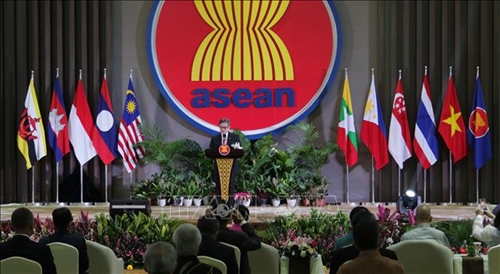“Thanks to the effective pandemic response and guided by the ASEAN Comprehensive Recovery Framework (ACRF) and its Implementation Plan, we have emerged safer, stronger, and more resilient as a community,” he said at the event, held by the ASEAN Secretariat at its headquarters in Jakarta to mark ASEAN’s 55th founding anniversary.
    |
 |
|
Secretary General of ASEAN Lim Jock Hoi addresses the event. |
ASEAN trade volumes have returned to pre-pandemic levels and the association’s economy is forecast to grow by 4.9% this year and 5.2% next year.
“The entry into force of the Regional Comprehensive Economic Partnership (RCEP) earlier this year demonstrates ASEAN’s pivotal role in contributing to regional peace and growth, bettering the life of our people, and providing opportunities for all.”
According to the Secretary General, in spite of these achievements, ASEAN must remain vigilant against the ever present risks to its recovery, including disruptions to the supply of key commodities, rising costs in food and logistics, and the economic slowdown in major economies that are projected to push more people into extreme poverty unless adequately addressed.
ASEAN needs to take heed of past experiences in order to be better prepared for future shocks, he said, adding that one key lesson of the pandemic is the importance of a community approach.
To this end, he emphasized the need to enhance regional integration and cooperation in the context that global links are become more complex. Upholding the principles of open regionalism, as well as ensuring ASEAN centrality and unity in the evolving regional and global architectures, should remain the bedrock of our efforts, Lim said.
It is essential for ASEAN to ensure that initiatives embracing digitization to create a thriving digital economy in a region of 463 million internet users, which is expected to reach 300 billion USD in 2025.
He also highlighted the importance of improving the productivity and competitiveness in these new drivers of growth by investing in the region’s human capital and providing greater access to health, future-ready education, skills training and lifelong learning, as well as a reliable social protection system.
Attention should be paid to the region’s youth, he said, noting that ASEAN should expand opportunities for young people to participate and contribute to policy-making and community development.
The official underlined the need for ASEAN to accelerate its green agenda in areas such as sustainable climate, biodiversity, livelihoods, circular economy, and energy efficiency with renewable energy.
Source: VNA